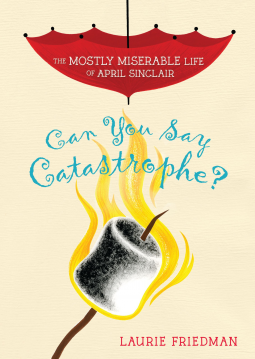 Can You Say Catastrophe is the first book in the new The Mostly Miserable Life of April Sinclair book series by Laurie Friedman. It is scheduled for release on October 1 2013. The story begins with the morning of April Sinclair's birthday and follows the spring and summer of her year. April wants the same things most tweens and teens want, to spend more time with her friends and less with her family, to be treated like an adult. While April tries to figure out ways to overcome embarrassing situations, her first kisses, changing friendships, and just what being thirteen really means all of her summer plans are changed and she is forced to take a road trip with the family rather than enjoying camp with her two best friends. Can anything good come from being trapped in an RV with her family for two weeks?
Can You Say Catastrophe is the first book in the new The Mostly Miserable Life of April Sinclair book series by Laurie Friedman. It is scheduled for release on October 1 2013. The story begins with the morning of April Sinclair's birthday and follows the spring and summer of her year. April wants the same things most tweens and teens want, to spend more time with her friends and less with her family, to be treated like an adult. While April tries to figure out ways to overcome embarrassing situations, her first kisses, changing friendships, and just what being thirteen really means all of her summer plans are changed and she is forced to take a road trip with the family rather than enjoying camp with her two best friends. Can anything good come from being trapped in an RV with her family for two weeks?Can You Say Catastrophe reads like the diary of a thirteen year old, and captures the feelings that most of us have at that age. April wants to be seen as grown up, but is not quite sure what that means or how she should go about making that happen. Like most, she is embarrassed and annoyed by her family while wanting to be seen as 'cool' by her friends and class mates. Adding the drama of a first crush and first kisses only makes the process of figuring out her place in the world and what she really wants that much harder for April. Readers that do not remember the feelings of absolutely everything being critical might be annoyed with the moments that seem over the top, however those that still remember well the insecurity and uncertainty of the big childhood transitions can see the truths of how we felt at the time. I think readers of age with April will be able to see that their fears are not unique to them, that they are far from alone in their questions and concerns, and that regardless of how absolutely horrible something might seem at the moment, it does get better.
I think that Can You Say Catastrophe is a realistic look at the emotional roller coaster that being thirteen involves. I think middle grade students will relate to the story and hopefully feel reassured about their own lives in the reading. I think parents with children approaching this age or firmly in its grasps might want to read this book as well, to remember what they felt like at that age, and to help relate to the changes and questions their own children might be facing.

No comments:
Post a Comment